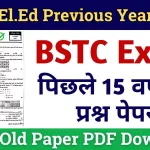B Ed 3rd semester exams are critical for students pursuing their Bachelor of Education degree. Understanding the question paper pattern and practicing diverse questions can significantly enhance preparation. Here, you’ll find questions and answers covering all major subjects from this semester to help you succeed in your exams.
Educational Psychology
Question What is educational psychology?
Answer
Educational psychology is a branch of psychology that studies how individuals learn and retain knowledge, primarily in educational settings.
Question Explain the role of motivation in learning.
Answer
Motivation drives individuals to engage in and persist with learning tasks. It enhances focus, effort, and achievement in educational contexts.
Question What are the stages of cognitive development according to Piaget?
Answer
Piaget identified four stages of cognitive development: sensorimotor, preoperational, concrete operational, and formal operational.
Question Define intelligence.
Answer
Intelligence is the ability to learn, understand, and apply knowledge and skills to adapt to new situations and solve problems.
Question What is the difference between intrinsic and extrinsic motivation?
Answer
Intrinsic motivation arises from within, driven by interest or enjoyment in the task, while extrinsic motivation is influenced by external rewards or pressures.
Question What is the significance of reinforcement in learning?
Answer
Reinforcement strengthens behavior. Positive reinforcement involves adding rewards, while negative reinforcement removes aversive stimuli to encourage desired actions.
Question How do heredity and environment influence learning?
Answer
Heredity determines innate abilities and potential, while the environment shapes skills, attitudes, and behaviors through experiences and education.
Question What is a learning disability?
Answer
A learning disability is a neurological disorder affecting the ability to read, write, speak, or compute, despite normal intelligence.
Question Explain the concept of transfer of learning.
Answer
Transfer of learning occurs when knowledge or skills acquired in one context are applied to another context effectively.
Question Describe the characteristics of a good teacher.
Answer
A good teacher is empathetic, knowledgeable, communicative, patient, innovative, and able to inspire and engage students effectively.
Question What are the major types of memory?
Answer
The major types of memory are sensory memory, short-term memory, and long-term memory.
Question How does stress affect learning?
Answer
Stress can impair attention, memory, and problem-solving, while chronic stress may negatively impact overall academic performance.
Question Define self-regulated learning.
Answer
Self-regulated learning refers to the process where learners control their thoughts, emotions, and actions to achieve their learning goals.
Question What is the role of feedback in education?
Answer
Feedback provides students with information about their performance, helping them understand their strengths and areas for improvement.
Question Explain Bloom’s Taxonomy.
Answer
Bloom’s Taxonomy classifies learning objectives into cognitive levels: knowledge, comprehension, application, analysis, synthesis, and evaluation.
Question What is the zone of proximal development?
Answer
The zone of proximal development is Vygotsky’s concept of the difference between what learners can do independently and what they can achieve with guidance.
Question What is the impact of peer learning on students?
Answer
Peer learning fosters collaboration, enhances understanding, and builds interpersonal skills through shared experiences and knowledge.
Question How can technology enhance learning?
Answer
Technology supports interactive learning, provides access to vast resources, and facilitates personalized education through adaptive tools.
Question What is the importance of emotional intelligence in education?
Answer
Emotional intelligence helps students manage emotions, improve relationships, and create a positive learning environment.
Educational Technology
Question What is educational technology?
Answer
Educational technology refers to the use of tools, processes, and resources to enhance teaching and learning.
Question Define ICT in education.
Answer
ICT, or Information and Communication Technology, involves digital tools and resources used to improve educational processes and outcomes.
Question What are the types of educational media?
Answer
Educational media include print media, audio-visual aids, digital content, and interactive platforms.
Question Explain the flipped classroom model.
Answer
In the flipped classroom model, students learn concepts at home via digital resources and engage in interactive activities in class.
Question What is the significance of e-learning?
Answer
E-learning enables flexible, accessible, and self-paced learning using online resources and platforms.
Question How does multimedia impact education?
Answer
Multimedia integrates text, audio, images, animations, and videos, enhancing engagement and understanding in education.
Question What is a smart classroom?
Answer
A smart classroom is equipped with advanced technology like interactive whiteboards and digital devices to facilitate modern teaching.
Question Describe computer-based testing.
Answer
Computer-based testing is an assessment method conducted digitally, offering immediate feedback and flexible scheduling.
Question What are the benefits of gamification in education?
Answer
Gamification increases motivation, engagement, and learning retention through interactive and reward-based activities.
Question Define open educational resources (OER).
Answer
Open Educational Resources are freely available teaching, learning, and research materials in the public domain.
Question How can virtual reality be used in education?
Answer
Virtual reality creates immersive experiences, allowing students to explore concepts and environments interactively.
Question What is the role of artificial intelligence in education?
Answer
Artificial intelligence personalizes learning, automates administrative tasks, and enhances engagement through adaptive systems.
Question What is blended learning?
Answer
Blended learning combines traditional classroom methods with online learning to provide a flexible and holistic approach.
Question Explain the importance of instructional design.
Answer
Instructional design creates structured, effective, and learner-centered educational experiences.
Question What are MOOCs?
Answer
MOOCs, or Massive Open Online Courses, are online courses accessible to a large audience worldwide.
Question What is the purpose of educational apps?
Answer
Educational apps provide interactive, accessible, and personalized learning experiences for diverse learners.
Question Define collaborative learning tools.
Answer
Collaborative learning tools like Google Docs or Trello facilitate teamwork and information sharing in educational projects.
Question How does online assessment benefit students?
Answer
Online assessment offers flexibility, instant feedback, and analytics to track student performance effectively.
Question What is the use of cloud computing in education?
Answer
Cloud computing provides scalable storage, easy access to educational content, and collaboration tools for students and teachers.
B Ed 3rd semester covers diverse topics essential for future educators. Practicing these questions helps students prepare thoroughly and build foundational knowledge. These questions and answers guide exam readiness while enhancing overall understanding. Dedication and focused study ensure success in exams and professional growth.
Latest Posts
- Step-by-step guide to download and apply for jee mains admit card 202
- Comprehensive 2025 government holidays and recruitment details for job seekers
- JEE Mains Admit Card 2025: Your Step-by-Step Guide to Downloading the Hall Ticket
- Everything You Need to Know About 2025 Government Holidays Recruitment
- Comprehensive Guide to rrb d group recruitment 2025 – Eligibility, Vacancies, and Application
- Detailed guide to nps trust recruitment 2025 vacancies, eligibility and apply process
- Comprehensive guide to hpcl recruitment 2025 notification, vacancies, and application process
- ignou bed admission 2025 complete recruitment guide with eligibility and process
- Comprehensive Guide to Indian Army Agniveer Recruitment 2025 Notification and Jobs
- Everything You Must Know About CBSE Board Exams 2025 Changes & New Rules






